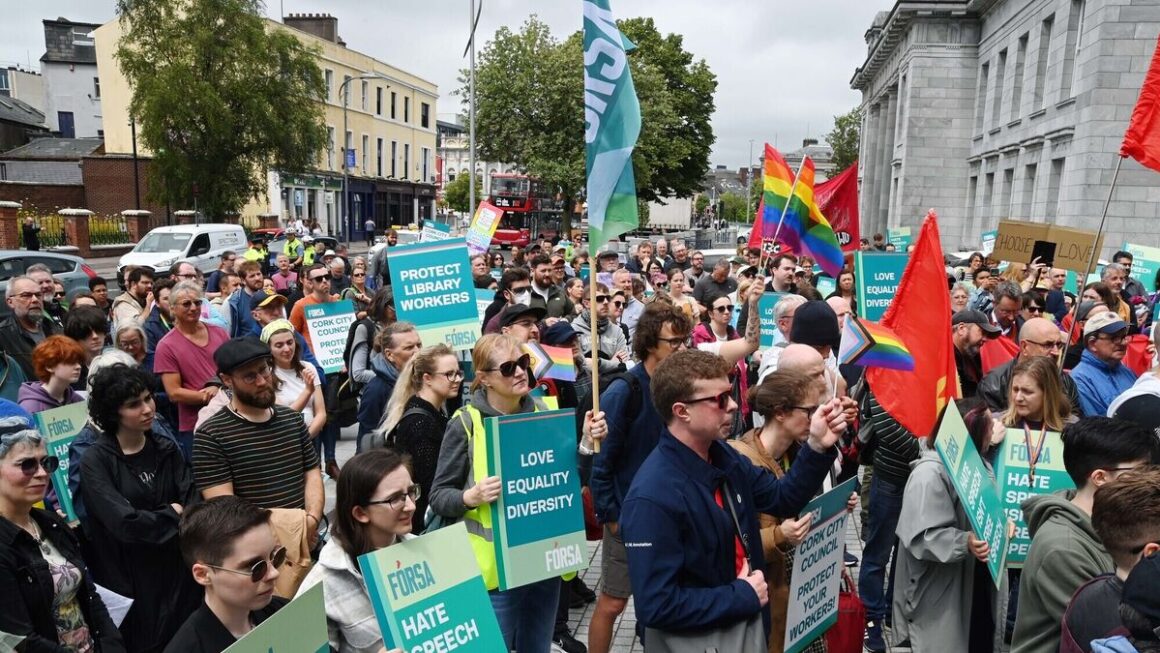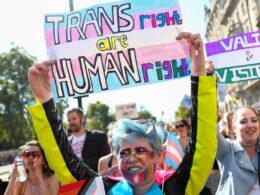By Finghin Kelly
The killing of Josip Strok has shockingly brought home the reality of hate crime. Josip was from Croatia and was with a friend when he was violently attacked and killed by a group in Clondalkin. His friend said they were set upon because they were not speaking English.
This killing is the bitter fruit of a whipping up of anti-immigrant rhetoric and racism by the far right. What’s more, this disgusting rhetoric has been legitimised by establishment politicians who are bending to it.
This shocking killing will send out a shockwave to the Croatian community, and immigrant communities generally, making them think twice about speaking in their languages or even being visibly out and about.
Rise in hate crimes
Sadly, Josip’s killing is not an isolated incident. It is part of an increase in racism and racist violence that includes a campaign of burning down buildings identified to accommodate asylum seekers and refugees. We have also seen increases in incidences of homophobia and transphobia, including physical attacks, only a handful of which get headlines.
Despite the huge shortcomings in the approach of the Gardaí to these types of hate crimes, increases in hate crime is reflected in official statistics. In the last year where statistics have been reported, 2022, there was a big jump by nearly a third in hate crimes recorded.
The far right’s campaign of hate is having an impact in society. It is also being legitimised by politicians in Fine Gael, Fianna Fáil, right-wing independents and even Sinn Féin, who are falling over themselves in taking up the far right’s talking points and endorsing an anti-immigrant narrative.
One example of the political establishment’s move to the right is its newfound opposition to the Hate Crime Bill, which all the main parties voted for last year.
Establishment’s shift to the right
Fine Gael’s Mayo TD Michael Ring called for its scrapping in the context of calling for a return to so-called ‘core values’ and abandoning social issues that have been ‘upsetting people’. Fianna Fáil’s Willie O’Dea has also come out against the Bill and linked it to ‘playing to the woke gallery’. Sinn Féin has also bent to the far right, calling for the Bill to be scrapped from a right-wing point of view.
The debate in Ireland is not divorced from an international campaign by the far right to oppose hate crime legislation. An example is JK Rowling’s provocatively defying the Scottish hate crime legislation.
The so-called Hate Crime Bill, or Criminal Justice (Incitement to Violence or Hatred and Hate Offences) Bill 2022 to give it its full title is currently before the Seanad. It has already been passed by the Dáil, which passed it in November 2022. As the Oireachtas has not been fully passed, it is still possible for the government to bring in amendments to it; this is something Simon Harris said ahead of his coronation as Taoiseach. What those amendments may be remains to be seen, but they are expected to see a rollback on aspects of the Bill that could protect oppressed groups.
Since passing the Dáil vote, the Bill has been subject to campaigning by the far right. Their real objections to the Bill lie in the fact that it is legislation for hate crime and for hate speech, areas where the far right would like less legal protections for those they are targeting with their hatred. However, they have cynically highlighted some of the genuine civil liberty issues with the Bill. Civil liberties that they have no concern for or record of defending in reality.
What approach should be taken to the Bill?
Socialists stand in complete solidarity with those who are victims of hate crimes and hate speech. We salute campaigners in groups such as the Coalition against Hate Crime for highlighting the impact of hate crime and hate speech and for pushing for action to be taken.
Hate crimes and hate speech have a real impact on people’s lives and the lives of oppressed groups. Being the victim of this crime is a difficult and shocking thing. It has a corrosive impact beyond the individual victim, telling people of oppressed groups that they can’t be themselves in public and reinforcing oppression.
It is correct and just that hate crimes and hate speech are criminalised. It is also right that people who are subject to hate seek to have legal tools and mechanisms that they can call upon to get justice.
The Socialist Party is in favour of hate crime and hate speech legislation. However, we did not support this Bill when it was before the Dáil due to serious concerns about its contents.
Section 10 of the Bill is particularly concerning. It criminalises the preparation or possession of hateful material, this does not just apply to material that was published but also that which has not been published. There is also an assumption that the material would be intended to be published, which unjustly puts the burden of proof onto the accused.
The Bill also gives a District Court judge the power to grant, on the word of a Garda of any rank, a wide-ranging search warrant that would allow Gardaí to search homes and electronic devices. This power is wide open to abuse by politically motivated Gardaí or judges.
Criminalising protest
The Bill’s use of a so-called demonstration test as evidence of hatred rather than a test of a criminal motive, heightens the risk of political abuse. This is a method that is only used in a handful of countries. It means that politically motivated judges and Gardaí could find it easier to tack on a hate crime prosecution to another more minor prosecution.
A Garda would just have to say that they heard the accused use hate speech while committing another offence, and this could be taken as evidence and used to convict. This could be used to stigmatise political movements and activists. We have seen how those who have been campaigning against the actions of the Israeli state in its oppression of the Palestinian people have been labelled as anti-Semitic. We could also see how people who rightly criticise and protest against people who spread transphobia, homophobia and sexism under the guise of it being a religious belief could be charged with a hate crime under this Bill.
The demonstration test system has shown itself to victimise vulnerable groups and minorities particularly. In the UK, for example, Black people are more likely to be convicted of hate crimes as a result. Having a hate crime conviction can be particularly stigmatising against people. Giving such powers to Gardaí and unaccountable District Court judges is wide open for abuse.
The idea of Gardaí and the judiciary using powers to clamp down on protest and opposition is not far-fetched. The state in Ireland and internationally have a long track record of doing so. The state is not a neutral force in society. It exists to back up the capitalist status quo and the position of those in power. Often laws that are introduced supposedly for one ostensible purpose are used in another, political way. We have seen Covid laws being used to prevent protests and strikes, like those by Debenhams strikers. Public order laws are regularly used against protesters and workers on strike.
We have also seen the courts used against anti-water charges activists in the Jobstown case, where the state brought false imprisonment charges against anti-water charges protesters to undermine an important movement against austerity.
How can we challenge hate?
We do support laws being introduced against hate crime and hate speech. We want to see substantial amendments to this legislation especially in relation to state powers. However, to really challenge racism, LGBTQIphobia and hate in all its ugly guises, we can’t rely on laws, the courts and the Gardaí.
We support the calls for the proper funding and roll-out of the national action plan against racism. This would be a progressive measure, but we need to go further than this, we need to tackle hate at its roots. Those roots lie in the capitalist system which rests on inequality, systematically plunging people into poverty, and precarity. It rests on an ideology of division to justify its rule.
An active movement involving the oppressed that challenges racists prejudices and fights for an end to the housing crisis and for a decent life for all can be the most effective way to push back and challenge racism, division, and bigotry in all its forms.












